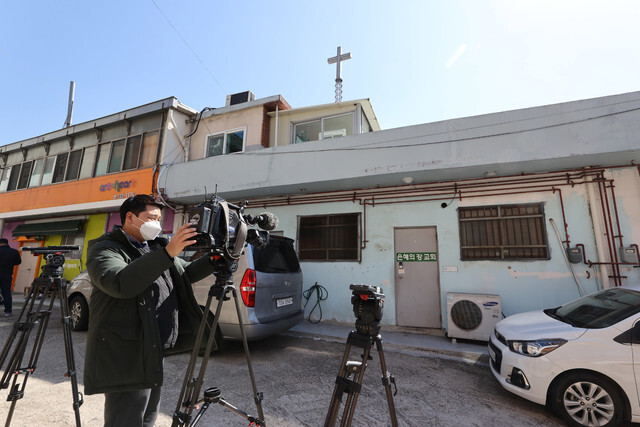hankyoreh
Links to other country sites 다른 나라 사이트 링크
[Editorial] Stronger measures against Churches may be necessary to stop additional transmission clusters

Despite some signs of abatement with declared coronavirus recoveries outnumbering new diagnoses, scattered cluster infections are continuing to crop up. The situation with cluster infections repeatedly surfacing around Protestant churches is a particularly serious concern. At the River of Grace Community Church in Seongnam, Gyeonggi Province, 48 people recently tested positive for the virus, including the pastor, his wife, and members of the congregation. After the 124 diagnoses at a call center in Seoul’s Guro District, it’s the second largest cluster outside of the Daegu/North Gyeongsang Province region.
Cluster infections involving 10 or more people have already been found at four churches in the Greater Seoul area alone, including Dongan Church in Seoul’s Dongdaemun District. It’s an alarming situation. But what’s especially worrying is that some of the churches went ahead with services without adequate preventive measures last Sunday, and they appear poised to continue doing so. We urge them to exercise restraint.
River of Grace, where 48 people tested positive in a congregation of 130, went ahead with services on Mar. 1 and 8. It uses the third floor of an old commercial building as its chapel and the fourth as a restaurant, with Seongnam city officials concluding that the transmission was hastened by the densely packed services and shared meals.
After 2,923 churches declared plans to hold services in a preliminary study, Gyeonggi Province sent around 600 government employees on Mar. 15 to conduct on-site surveys in its 31 cities and counties. A checklist was reportedly developed to verify whether they were implementing preventive measures such as temperature checks, the use of masks and hand sterilizer, and maintaining a distance of at least two meters between persons as initially promised. While most of the churches were observing the guidelines, quite a number were found not to be; in some cases like River of Grace’s, people were not keeping their distance because the spaces were small to begin with.
Some of the smaller churches have also reported financial issues with the adoption of alternative online services, including difficulties acquiring video equipment and the burden of building rental costs. According to findings announced on Mar. 12 from a survey of 276 Protestant churches by a Protestant ministers’ group, 93% reported that donations had declined since the transition to online services.
Gyeonggi Province is not alone in facing the risk of cluster infections through on-site church services. According to Seoul Mayor Park Won-soon, 33% of all churches in the city are holding services on site. Some, like Seoul’s Kwanglim Methodist Church, have resumed on-site services after holding them online for two or more weeks. Some of the megachurches have continued their on-site services all the while, insisting that they have been observing prevention rules such as temperature checks and hand sanitizing. It would be terrific if they were upholding the rules, but quite a few places have not. If churches continue holding on-site services without adequate preventive measures, we may need to consider a more aggressive approach, such as an administrative order by Gyeonggi Province.
Please direct comments or questions to [english@hani.co.kr]

Editorial・opinion
![[Column] Season 2 of special prosecutor probe may be coming to Korea soon [Column] Season 2 of special prosecutor probe may be coming to Korea soon](https://flexible.img.hani.co.kr/flexible/normal/500/300/imgdb/original/2024/0426/3317141030699447.jpg) [Column] Season 2 of special prosecutor probe may be coming to Korea soon
[Column] Season 2 of special prosecutor probe may be coming to Korea soon![[Column] Park Geun-hye déjà vu in Yoon Suk-yeol [Column] Park Geun-hye déjà vu in Yoon Suk-yeol](https://flexible.img.hani.co.kr/flexible/normal/500/300/imgdb/original/2024/0424/651713945113788.jpg) [Column] Park Geun-hye déjà vu in Yoon Suk-yeol
[Column] Park Geun-hye déjà vu in Yoon Suk-yeol- [Editorial] New weight of N. Korea’s nuclear threats makes dialogue all the more urgent
- [Guest essay] The real reason Korea’s new right wants to dub Rhee a founding father
- [Column] ‘Choson’: Is it time we start referring to N. Korea in its own terms?
- [Editorial] Japan’s rewriting of history with Korea has gone too far
- [Column] The president’s questionable capacity for dialogue
- [Column] Are chaebol firms just pizza pies for families to divvy up as they please?
- [Column] Has Korea, too, crossed the Rubicon on China?
- [Correspondent’s column] In Japan’s alliance with US, echoes of its past alliances with UK
Most viewed articles
- 11 in 5 unwed Korean women want child-free life, study shows
- 2AI is catching up with humans at a ‘shocking’ rate
- 3[Editorial] Yoon cries wolf of political attacks amid criticism over Tokyo summit
- 4[Photo] “Comfort woman” survivor calls on president to fulfill promises
- 5“Japan’s No. 1 salesman”: Korean groups blast president’s treatment of forced laborers
- 6Yoon calls 60+ hour workweek “unreasonable,” orders revamp of policy
- 7[Editorial] Yoon’s white flag on historical disputes with Japan backfires immediately
- 8‘We must say no’: Seoul defense chief on Korean, USFK involvement in hypothetical Taiwan crisis
- 9[Special reportage- part I] Elderly prostitution at Jongmyo Park
- 10[Photo] More Sewol paintings by Hong Sung-dam